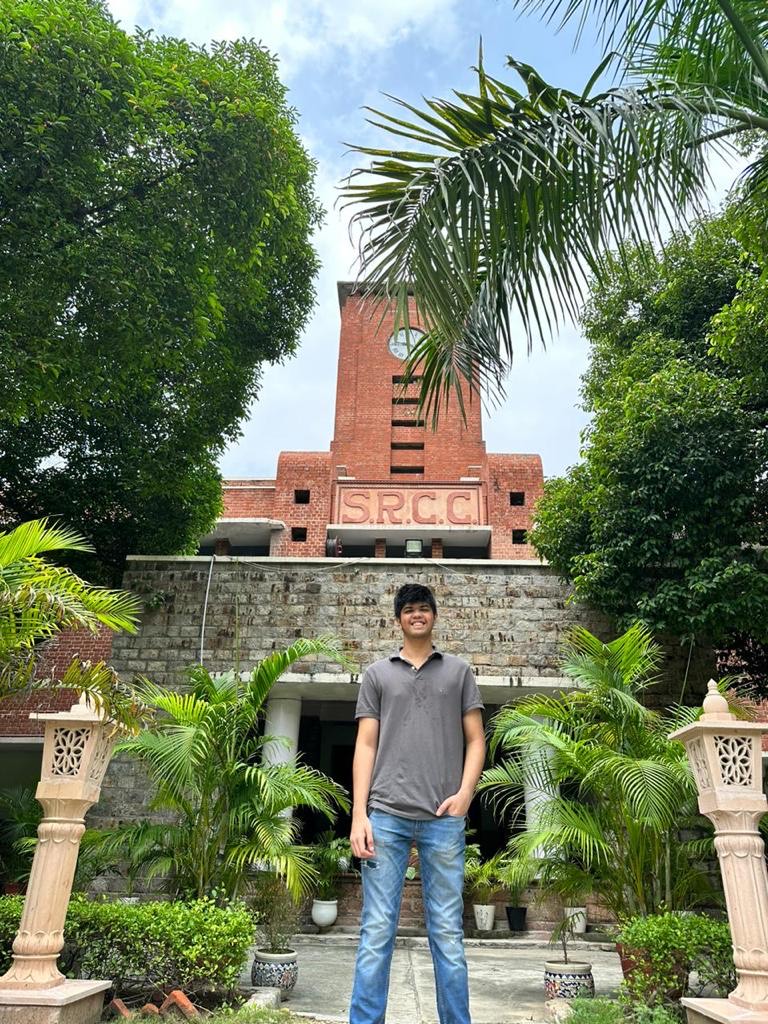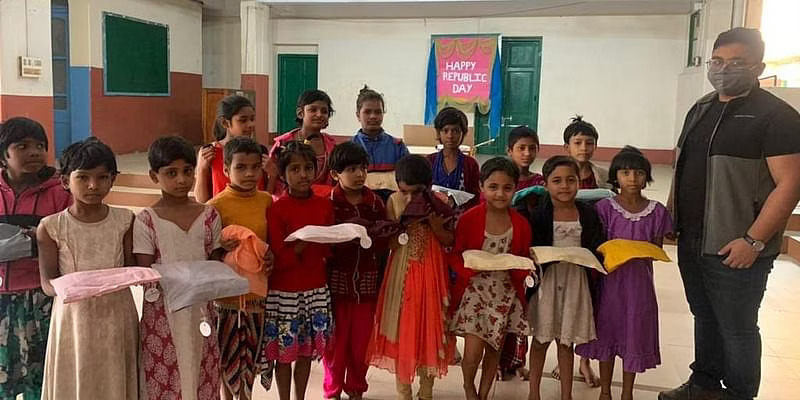(January 26, 2024) Up to 7800 kilotonnes of textile waste gets accumulated in India each year with pre-consumer waste making for a steep 42 percent, out of which 17 percent ends up in landfills. Seeing piles of wasted fabric stacked in corners of his dad’s Kolkata-based textile factory (Onaya Fashions) led to the birth of the Onaya Foundation in 2018 with a mission to give textile waste a second lease of life. They upcycle discarded textile waste into garments for underprivileged children. “Till now we have reached out to 6000 children with the help of NGOs and have upcycled 5500-6000 meters of cloth,” Tanay tells Global Indian.
What began as donations by family members and friends to the underprivileged on special occasions grew during the lockdown when it opened its doors to the world owing to Tanay’s vision of expansion. “We often visited orphanages during birthdays and donated clothes. But during the lockdown, we decided to open this idea to the world, where people could donate garments made from upcycled textile waste to the underserved,” reveals the 18-year-old, who is studying B.Com (H) at Sriram College of Commerce. Conceptualised by his aunt Vandana Jain in 2018, the foundation expanded its horizon in 2020 upon Tanay’s behest. It began with making an Instagram page to invite keen donors. “They could contact us and we would find an NGO near their place, contact them, take details of the number of children, their age and sizes, and make clothes for them using the textile waste generated from my dad’s factory,” says Tanay.

Tanay Jain
In no time, the orders started coming in bulk, especially during the festive season. The contractual karigars stitch kurtas for boys and kurtis for girls at a nominal charge of ₹200. “We wanted to pay the marginalised karigars during Covid-19, especially when they needed an additional source of income,” says the teenager, whose foundation has till now made multiple donations to 50-60 NGOs across West Bengal, Odisha, Tamil Nadu, and Assam. “We supply the karigars with textile waste which is mostly cloth patches and depending on their creativity and ingenuity, they make a kurta/kurti out of it.” Tanay says that through the Onaya Foundation, the children at NGOs are getting to wear new garments on their birthdays, “something that wasn’t happening before, and makes it special for them too.”
The dream of being a social entrepreneur
Born in a business family, Tanay was witness to many dining table conversations that revolved around textiles. But seeing his family inclined towards serving society, he had decided at a young age that social entrepreneurship was the way forward. “I wanted to create an impact in the society through my work. However, I was too young to understand what I wanted to partake in until the lockdown happened, and I became more interested in the work that The Onaya Foundation is doing,” says the teenager, whose foundation has made over 7000-8000 donations till now from their factory waste. “You can imagine the kind of textile waste that’s generated from the factories that operate on a larger scale.”


The positive impact
In the last few years, the Onaya Foundation has made a positive impact not only in the lives of underprivileged kids but the environment as well, especially in the times of fast fashion when a lot of textile waste makes it to landfills, thus causing environmental hazards. Their foundation looks into pre-consumption waste that is accumulated during the making of a garment. “Our idea was to start a cycle where the yarn or the fabric comes from nature and we give back to nature by upcycling textile waste. Moreover, we have also planted saplings and trees from the surplus funds we have received through donations,” explains Tanay.
Started as the Katran Foundation in 2018, they have recently renamed it the Onaya Foundation. “The reason we have incorporated it under the Onaya Fashions is that it gives us a lot of resources to market it, create more impact, and formalise the structure. That’s what we plan to do in the next two years,” reveals Tanay, who looks into the marketing, awareness, and donation drives. His aunt, on the other hand, handles manufacturing and upcycling.


Tanay with his aunt Vandana Jain
Dwelling on the challenges that Tanay faced during the process, he says not getting enough donations was heartbreaking. “Also, creating awareness on textile waste and donations at a student level when people don’t take you seriously was a constant struggle,” he says, adding, “People often question your motivation thinking you are doing it for your CV. But since I had no inclination to study abroad and no external motive, people understood that it was of personal value to me,” says Tanay for whom the entire experience has been humbling. “It has made me understand my privileges and how I can use them for the betterment of the society.”


Sustainable fashion is the future
Ask if India is ready for sustainable fashion, the teenager says, “Things have improved in the last few years but it was difficult for us to spread awareness as people had no idea about textile waste causing environmental concerns.” At the same time, he is happy that many companies are now championing the cause in the textile industry. “Some people are ready to pay a 20 percent premium for clothes that are sustainable than those that cause environmental hazards. At the same time, it’s at a level where people are privileged. In a country like India, people have affordability issues as they care more about the price of the product than its impact. The kind of donations we are doing with The Onaya Foundation is done on a small level but when you look at the problem from a bigger lens, many people still cannot afford two meals a day in India, which puts a lot of things into perspective. I am grateful that the awareness is being spread but there is a long way to go,” he signs off.
- Follow Tanay Jain on LinkedIn




